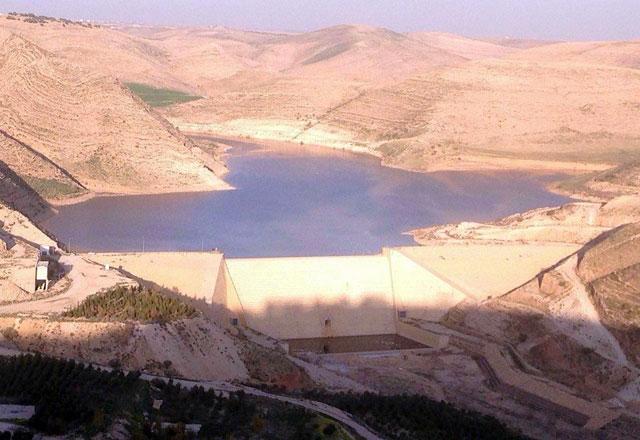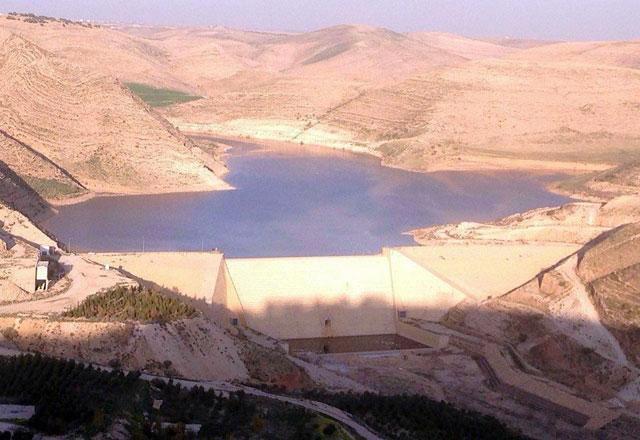You are here
Gov’t to float tender to increase capacity of Waleh Dam — minister
By Hana Namrouqa - Jul 30,2016 - Last updated at Jul 31,2016

Construction of the Waleh Dam, located in Madaba, began in 1999 and it became operational in 2002 at a cost of JD24 million (Photo courtesy of Water Ministry)
AMMAN — The government will float a tender next week to raise the walls of the Waleh Dam to more than double its capacity, government officials said on Saturday.
Under the project, the dam’s storage capacity will increase from 9.6 million cubic metres (mcm) to 25mcm, Water Minister Hazem Nasser said in a statement e-mailed to The Jordan Times.
“Raising the walls of the dam will allow the storage of additional rainwater to provide Madaba Governorate with more drinking water,” Nasser said, adding that construction was expected to be completed within two years.
The Waleh Dam has reached its full capacity and overflowed several times in recent years, according to the ministry.
Construction of the dam, located in Madaba, began in 1999 and it became operational in 2002 at a cost of JD24 million, 80 per cent of which was funded by a loan from the Arab Fund for Economic and Social Development, while the remainder was paid for by the Treasury.
The walls of the dam will be raised by 15 metres, according to Nasser, who said that the project would cost JD28 million.
The ministry spokesperson, Omar Salameh, said the project would be funded by the environmental compensation granted to Jordan by the United Nations Compensation Committee (UNCC).
The terrestrial ecosystems of the Jordanian badia were severely damaged following the 1991 Gulf War, when masses of refugees and their livestock — estimated at 1.8 million sheep, goats and camels — crossed the border and stayed in the country for several months.
In 2005, the UNCC decided to grant Jordan $160.5 million in compensation for damage incurred by the Kingdom’s water, environment, wildlife, marine life and agriculture sectors in the aftermath of the Gulf War I, in addition to $1.4 million to tackle the salinity of the country’s underground water basins.
The funds are being used to support projects that focus on rehabilitating the badia’s ecosystem to its former status and tackling the negative consequences of random grazing and wildlife deterioration.
Nasser underscored that the project would also develop the area’s environment, tourism and economy, highlighting that it supported agricultural, tourist and industrial investments.
Also in the statement, Environment Minister Yaseen Khayyat said that the ministry was pressing ahead with enhancing rainwater harvesting techniques in the badia to improve the environment and the living conditions of cattle breeders.
He noted that 62 ponds and desert dams have been established under the environmental compensation programme to hold 5mcm.
There are currently 10 major dams in Jordan with a capacity of 325mcm, as well as more than 143 large ponds to collect floodwater in the desert and over 25 sand dams, according to the ministry. Plans are under way to raise the capacity of the Kingdom’s dams by 25 per cent to reach 400mcm by the year 2025, according to the ministry, which said that this would be achieved by building more dams and raising the walls of existing ones, including the Waleh Dam.
Related Articles
AMMAN — Construction work on a project to raise the walls of the Waleh Dam to more than double its capacity has commenced, a government offi
AMMAN — Raising the walls of Madaba Governorate’s Waleh Dam began on Wednesday, under a project aimed at restoring the original environmenta
AMMAN — Construction is under way to establish 23 sand ponds across the desert before the onset of the next wet season, an official said on

















